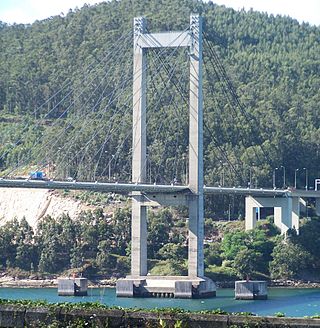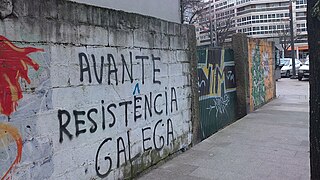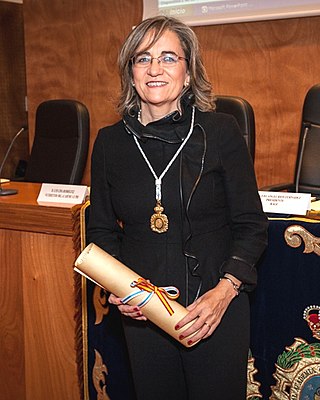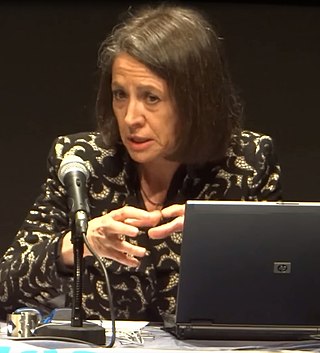
Galicia is an autonomous community of Spain and historic nationality under Spanish law. Located in the northwest Iberian Peninsula, it includes the provinces of A Coruña, Lugo, Ourense, and Pontevedra.

Santiago de Compostela, simply Santiago, or Compostela, in the province of A Coruña, is the capital of the autonomous community of Galicia, in northwestern Spain. The city has its origin in the shrine of Saint James the Great, now the Cathedral of Santiago de Compostela, as the destination of the Way of St. James, a leading Catholic pilgrimage route since the 9th century. In 1985, the city's Old Town was designated a UNESCO World Heritage Site.
The Xunta de Galicia is the collective decision-making body of the government of the autonomous community of Galicia, composed of the President, the Vice-president(s) and the specialized ministers (Conselleiros).

The University of Santiago de Compostela - USC is a public university located in the city of Santiago de Compostela, Galicia, Spain. A second campus is located in Lugo, Galicia. It is one of the world's oldest universities in continuous operation.

Boimorto is a municipality in the province of A Coruña, in the autonomous community of Galicia, northwestern Spain. It is located in the comarca of Arzúa. It has an area of 82.71 km2, a population of 2,486, and a population density of 30.06 people/km2. Coordinates: 43° 00' 27" N - 8° 07' 37" W. Elevation: 487 m.

Galicia's two major economic poles are A Coruña and Vigo, with A Coruña in the lead, producing an estimated 33.2% of VAT receipts against 24.3% from Vigo. A third economic center is Santiago de Compostela, capital of Galicia. Other important cities are Ferrol and Pontevedra. In recent years the distance has grown between the interior provinces, Lugo and Ourense, which are more rural and less developed, and the coastal provinces, Pontevedra and A Coruña, particularly the areas situated along the axis of the A-9 Highway.

Marcelino Oreja Aguirre, 1st Marquess of Oreja is a Spanish lawyer, diplomat and politician of the People's Party. He served as Foreign Minister of Spain between 1976 and 1980. Between 1984 and 1989 he was Secretary General of the Council of Europe. In 1989 he became member of the European Parliament and he served until 1993. In 1994 he was appointed European Commissioner for Transport and Energy and then European Commissioner for Institutional Relations and Communication Strategy.

Resistência Galega, sometimes referred to as REGA, is the term used by a series of left-wing and Galician separatist organisations and individuals to claim attacks in Galicia. The term was first used in 2005 when a manifesto named Manifesto da Resistência Galega appeared on the Internet. Since then, Resistência Galega has carried out dozens of attacks against political party offices and banks across Galicia.
The Fonseca Prize of science communication is an annual award created by the University of Santiago de Compostela and the Consortium of Santiago under the auspices of the Program ConCiencia.
Carlos Ferrás Sexto is a Galician geographer and academic.

Renewal–Nationalist Brotherhood is a political party in Galicia. Formed in 2012, under the guidance of historical leader Xosé Manuel Beiras, Anova was formed by Encontro Irmandiño, the FPG, Movemento pola Base, the Galician Workers Front, and independents. Anova defines itself as a Galician nationalist, socialist, feminist, ecologist, internationalist organization and advocates for Galician independence. Its internal organization is run by assemblies.

Isca! is the name of a Galician youth organization that promotes Galician independence, combined with anti-capitalist and feminist ideology. They are linked to the Galician Movement for Socialism, a socialist and pro-independence party that forms part of the Galician Nationalist Bloc (BNG).

En Marea was a political party and former political alliance integrated by Podemos, Anova, United Left of Galicia, and some municipal alliances that participated in the 2015 Spanish local elections. It was formed in November 2015 as an electoral coalition to contest the 2015 Spanish general election in Galicia. As part of the coalition agreement with Podemos, the name on the ballot paper for both the 2015 and 2016 general elections was Podemos–En Marea–Anova–EU.

María José Alonso Fernandez is a full professor of biopharmaceutics and pharmaceutical technology at the University of Santiago de Compostela. The laboratory she leads is specialized in pharmaceutical nanotechnology and nanomedicine, and her research is oriented to the development of nanostructures for targeted delivery of drugs and vaccines. Her discoveries have led to significant clinical advances in the development of potential new treatments for cancer, ocular diseases, skin diseases, diabetes, obesity and other autoimmune pathologies, as well as new vaccines.

The 2020 Galician regional election was held on Sunday, 12 July 2020, to elect the 11th Parliament of the autonomous community of Galicia. All 75 seats in the Parliament were up for election. The election was initially scheduled for 5 April 2020 but was postponed as a result of the COVID-19 pandemic. It was held simultaneously with a regional election in the Basque Country.

The Third Feijóo Government was the regional government of Galicia led by President Alberto Núñez Feijóo between 2016 and 2020. It was formed in November 2016 after the September regional election.

Galicia en Común was a left-wing alliance in Galicia formed by Podemos and United Left (EU) as a successor to the En Marea alliance, which after turning into a party broke up from their three constituent parties in early 2019 as a result of political and leadership differences. The alliance has contested the April 2019 and November 2019 Spanish general elections under the En Común–Unidas Podemos label, and it also exists as a sub-group within the Unidas Podemos confederal parliamentary group in the Congress of Deputies. In September 2019, Podemos and EU, together with Renewal–Nationalist Brotherhood, comprised the Grupo Común da Esquerda parliamentary group, and the alliance is scheduled to be renewed ahead of the 2020 Galician regional election.
María Teresa Miras Portugal was a Spanish scientist, pharmacist, biochemist, molecular biologist and Emeritus professor at the Complutense University of Madrid. She was a member of the Spanish "Real Academia Nacional de Farmacia" and served as President of this Institution from 2007 to 2013, becoming the first female to be elected for this position in a Spanish "Real Academia". She was Honorary President.

Ofelia Rey Castelao is a Galician historian, writer, and university professor. Focusing her research on women's history, she studies female migration and the insertion of Galician women in the literate culture. Rey Castelao was awarded the Premio Nacional de Historia de España in 2022.

Os Renovadores or Os Novos was a group of artists who wanted to renew the visual Galician arts from the 1920s.

















